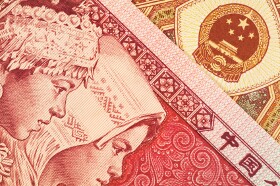
The Chinese yuan is weakening against most major currency rivals midweek as reports suggest that the Peopleâs Bank of China (PBoC) is considering a reduction in interest rates that financial institutions are required to pay depositors. Analysts are still bearish on the worldâs second-largest economy, warning of double-digit economic contraction in the first quarter of 2020. Will the central bank implement more monetary stimulus measures?
As China hits the reboot button and gradually returns to normal in the aftermath of the nationâs coronavirus crisis, policymakers are attempting to juice the economy with fiscal and monetary tools.
In order to help banks squeeze out better profit margins, the PBoC could announce a deposit rate cut in the coming days for the first time in five years. Officials believe this would help widen the spread between how much banks pay to depositors and how much they charge for loans. Although the main objective would be to protect financial institutions, the other benefit is that it might spur spending.
Sources also tell The Financial Times that the PBoC might make more cuts in its medium-term lending facility. This influences the benchmark loan prime rate (LPR) that was introduced last year as part of the nationâs market-oriented reforms.
Meanwhile, since the government has recruited banks to rev up the economy, a lot of banks have decreased interest rates and increased the amount of money they will lend to consumers. Despite the dramatic spike in defaults, Beijing is turning to credit markets to help lift domestic consumption. For the rest of the year, experts say that many state-owned lenders will offer promotions â lower rates, relaxed credit controls, and higher amounts â even though they know the loan might not be repaid.
The retail sector is also doing its part in trying to stimulate the economy. A whole host of retailers are offering major discounts, from movie theaters to coffee shops. Municipal governments are also working with local governments to encourage shoppers to start spending.
This comes as an independent survey of more than 3,300 businesses suggests the national economy will slide as much as 11% in the January-to-March period. The China Beige Book study says there may be a slight uptick in the final days of March, but the Q1 contraction will still be steep.
Crucially the results continued to deteriorate into mid-March when most firms were re-opening and supposedly âback to work.â
Nationally, our revenue index plunged to -26 this quarter while profits dove in tandem, to -22.
The USD/CNY currency pair rose 0.73% to 7.1144, from an opening of 7.0631, at 16:56 GMT on Wednesday. The EUR/CNY advanced 1.34% to 7.7216, from an opening of 7.6193.
If you have any questions, comments, or opinions regarding the Chinese Yuan, feel free to post them using the commentary form below.